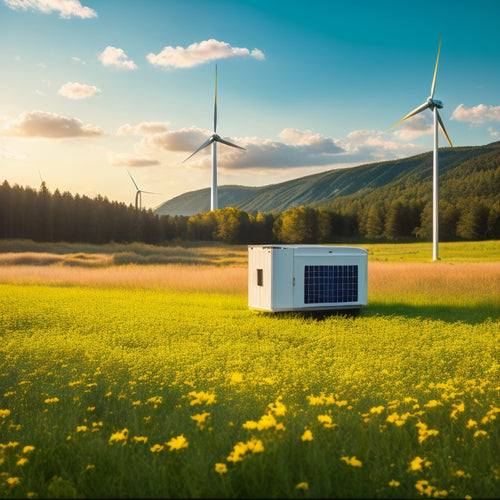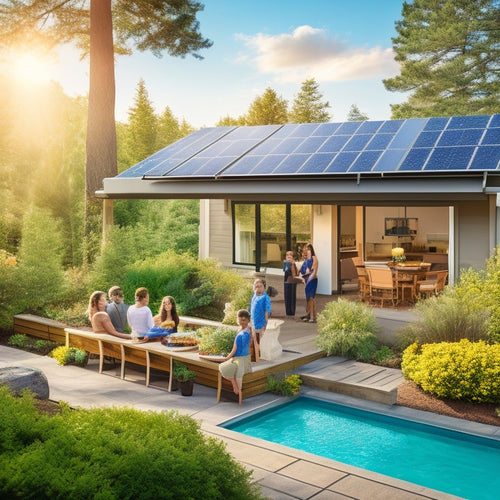
RV Energy Independence Made Easy
Share
You're about to discover the freedom to roam wherever you want, whenever you want, without being tied to a power outlet, as 75% of RV owners switch to solar power systems to achieve energy independence. To make the shift smooth, start by calculating your RV's power consumption to determine energy storage and sources. Next, optimize energy efficiency by evaluating appliance wattage requirements and implementing load management to prevent overloading and extend battery lifespan. With the right solar panels, deep cycle batteries, and system design, you'll be well on your way to energy independence - and that's just the beginning of your off-grid journey.
Overview
- Calculate your RV's power consumption to determine energy storage and generation needs for off-grid use.
- Optimize energy efficiency by evaluating appliance wattage requirements and implementing load management.
- Choose the right solar panels based on energy needs, roof space, and weight capacity to ensure optimal energy generation.
- Select and maintain deep cycle batteries suitable for repeated charging cycles, and monitor their performance for longevity.
- Design and install a solar power system that accurately sizes the battery bank capacity and accounts for energy consumption patterns.
Understanding RV Energy Needs
As you prepare to cut the umbilical cord from campsites and experience the freedom of RV energy independence, understanding your energy needs becomes vital.
You need to calculate your power consumption to determine the right energy storage and power sources for your RV. To do this, determine your daily energy needs to size your solar panel system for off-grid use solar panel system and plan for an off-grid lifestyle by generating sufficient power through a solar array.
Assess your appliance usage, considering the wattage requirements of each device, to optimize energy efficiency. Load management is essential to prevent overloading and extend battery lifespan.
Choose the right inverter type to guarantee efficient energy conversion. By understanding your energy needs, you can implement effective energy conservation strategies, reducing your reliance on campsites and enjoying the freedom to roam.
Choosing the Right Solar Panels
You'll want to choose solar panels that balance efficiency with size and weight constraints. Efficient panels will generate more power per hour of sunlight, but may come at a higher cost.
When selecting the right panels for your RV, you'll need to take into account factors like energy output, roof space, and weight capacity to find the best solution. Understanding your specific energy needs, including daily energy usage and appliance wattage, is vital in determining the right panel size and configuration assess specific energy needs.
Additionally, categorizing appliances into essential and non-essential can help prioritize power allocation and guarantee a reliable power supply.
Solar Panel Efficiency
Efficiency is the unsung hero of solar panel performance, quietly amplifying the power output of your RV's solar array.
When choosing the right solar panels, you need to take into account the efficiency of different solar panel types. To guarantee peak energy generation, high-efficiency solar panels should exceed 20% efficiency, which is vital for space-limited off-grid settings.
Monocrystalline silicon panels offer the highest efficiency, typically ranging from 18% to 22%. Polycrystalline silicon panels are a close second, with efficiencies between 15% and 18%. Thin-film panels are less efficient, but still a viable option.
A more efficient panel means more power output per square foot, which is essential for your RV's limited roof space. Additionally, take into account the solar panel lifespan, as more efficient panels tend to last longer, providing you with consistent energy independence for years to come.
Panel Size and Weight
When selecting solar panels for your RV, the efficiency rating is just one piece of the puzzle.
You also need to contemplate the panel size and weight. These factors will impact how much power you can generate and how easily you can transport your RV.
You'll need to balance your energy needs with the available roof space and your RV's weight capacity. Typically, solar panels range from 100 to 400 watts, with corresponding panel dimensions and weights.
For example, a 200-watt panel might measure 58 inches by 26 inches and weigh around 40 pounds.
Selecting Deep Cycle Batteries
Typically, RVers require a deep cycle battery that can handle the rigors of repeated charging and discharging cycles.
You'll want to choose a battery designed for deep cycling, as they're built to withstand the demands of your RV's electrical system. There are several battery types to take into account, including flooded, AGM, and lithium-ion. Each has its own advantages and disadvantages, so it's vital to research and compare their features.
When selecting a deep cycle battery, think about the number of charging cycles you need. A higher cycle life means your battery will last longer and provide more power over time.
Look for batteries with a high amp-hour rating and a low self-discharge rate to guarantee you have reliable power when you need it.
Designing a Solar Power System
You'll need to carefully choose the right solar panels for your RV's energy needs, considering factors like power output, durability, and mounting options.
To guarantee your system can keep up with your energy demands, you'll need to accurately size your solar power system, factoring in your battery bank's capacity and your RV's energy usage patterns.
Solar Panel Selection
Selecting the right solar panels is an essential step in designing a solar power system that meets your RV's energy needs.
You'll want to evaluate the different solar panel types, such as monocrystalline, polycrystalline, and thin-film, each with its own efficiency and durability characteristics.
Monocrystalline panels are the most efficient, but also the most expensive. Polycrystalline panels offer a good balance between efficiency and cost. Thin-film panels are the least expensive, but also the least efficient.
When choosing your solar panels, you'll also need to examine solar inverter options, such as string inverters, microinverters, and power optimizers, which convert DC power from the panels to AC power for your RV.
System Sizing Essentials
With your solar panels chosen, it's time to design a solar power system that meets your RV's specific energy demands.
You'll need to determine your energy consumption patterns, considering factors like appliance usage, battery type, and charging habits. Calculate your daily energy usage in amp-hours (Ah) to determine the required system capacity.
Next, select an inverter that suits your needs, choosing from pure sine wave, modified sine wave, or square wave types. Consider the inverter's continuous power rating, surge capacity, and efficiency.
Installing Solar on Your RV
Installing solar panels on your RV is an essential step towards achieving energy independence.
When planning your solar installation, consider the size and layout of your RV's roof. Be mindful of vents, skylights, and other obstructions that may affect panel placement.
Follow solar installation tips, such as using a sturdy mounting system and ensuring a secure connection to your RV's electrical system.
Also, assess your RV roof's condition, checking for any signs of wear or damage that may impact the installation.
Monitoring and Maintaining Power
You've invested in a solar panel system, and now it's time to confirm you're getting the most out of it. Monitoring and maintaining your power is vital for energy independence.
It's important to keep track of your energy consumption and budget to guarantee you're staying within your means. A monitoring system will help you identify areas of inefficiency and optimize your power management.
Regular battery maintenance and inverter selection are also significant for maximizing your energy output. Consider solar upgrades to increase your energy production and reduce your reliance on external power sources.
Off-Grid RV Living Essentials
Embracing off-grid RV living requires a well-thought-out strategy and the right equipment to guarantee a comfortable, self-sustaining experience.
You'll need essential systems like water filtration and waste management to maintain a healthy environment. Portable generators and off-grid appliances will provide the power you need, while energy conservation measures will help you make the most of it.
Proper battery maintenance, understanding inverter types, and utilizing charging stations will keep your batteries in top shape. You'll also need to manage propane usage efficiently.
Don't forget to prioritize RV insulation to regulate your interior climate. By incorporating these essentials, you'll be well on your way to achieving true off-grid RV living independence.
Frequently Asked Questions
Can I Mix Old and New Batteries in My RV Solar Power System?
You shouldn't mix old and new batteries in your solar power system, as it'll compromise battery compatibility and charging efficiency, reducing overall performance and freedom on the road.
How Do I Protect My Solar Panels From Hail Damage?
Did you know 1 in 40 homes in hail-prone areas experience damage each year? To safeguard your solar panels, you'll want to invest in hail-resistant materials, such as tempered glass or polycarbonate, and consider protective covers for added peace of mind.
Can I Use My Rv's Built-In Converter for Charging Batteries?
You can use your RV's built-in converter for charging batteries, but be aware it may not be the most efficient option for RV battery maintenance, and its converter efficiency might not fully charge your batteries, limiting your freedom on the road.
Do I Need a Separate Solar Charge Controller for Each Panel?
You're not stuck in the dark ages of RVing, and you'll be thrilled to know that, no, you don't need a separate solar charge controller for each panel - a single controller can handle multiple panels, maximizing panel efficiency and your solar charge.
Will Solar Power Systems Work With My Rv's Existing Electrical System?
You'll be relieved to know that solar power systems can seamlessly integrate with your RV's existing electrical system, ensuring solar panel compatibility and efficient energy distribution, giving you the freedom to roam without worrying about power constraints.
Ready to Buy
You've finally broken free from the shackles of RV parks and their pesky electrical hookups! With your solar-powered system, you're now the ruler of your own energy destiny. Imagine a giant, flexing arm made of solar panels, batteries, and wires, proclaiming "I'm energy independent, hear me roar!" As you drive off into the sunset, your RV's energy independence is the ultimate middle finger to the grid.
Related Posts
-

Is This the Future of Alternative Energy Systems
Yes, alternative energy systems are shaping the future of energy. Innovations in solar and wind technologies are driv...
-

Sustainable and Eco-Friendly Generators for a Reduced Carbon Footprint
Sustainable and eco-friendly generators are perfect for cutting your carbon footprint and increasing energy efficienc...
-

Top-Rated Home Solar Power Kits for Achieving Energy Independence
Top-rated home solar power kits enable you to achieve energy independence by greatly cutting your energy costs. You c...


